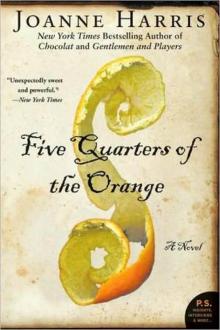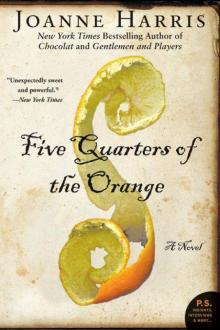- Home
- Joanne Harris
Holy Fools Page 2
Holy Fools Read online
Page 2
Then we have Soeur Antoine, plump and red-faced, hands perpetually greasy from her cook pots, mother of a dead child at fourteen. Some say she killed it herself; others blamed her father in his rage and shame. She certainly eats well for all her guilt; her stomach is perpetually swollen beneath the seam of her wimple, her helpless, moony face bracketed by half a dozen quivering chins. She holds her pies and pastries to her bosom like children; difficult to tell, in these shadows, who is feeding whom.
Soeur Alfonsine: white as bone but for the red spot on either cheek, who sometimes coughs blood into her palm and who lives in a state of perpetual exaltation. Someone has told her that the afflicted have special gifts, denied to those who are sound in body. As a result she cultivates an otherworldly air and has seen the devil many times in the form of a great black dog.
And Perette: Soeur Anne to you, but always Perette at heart. The wild girl who never speaks, aged thirteen or a little older, found naked on the seashore a year ago last November. For the first three days she would not eat but sat motionless on the floor of her cell, face turned to the wall. Then came the rages; the smeared excrement, the food flung at the sisters who tended her; the animal cries. She flatly refused to wear the clothes we gave her, strutting naked about the freezing cell, occasionally giving voice to the tongueless hooting sounds that signaled her frenzies, her strange sorrows, her triumphs.
Now, one might almost take her for a normal child. In her novice’s whites she is nearly pretty, singing our hymns in her high wordless voice, but happiest in the garden and the fields, wimple discarded on a bramble bush, skirts flying. She still never speaks. Some wonder if she ever did. Her eyes are gold-ringed, unreadable as a bird’s. Her pale hair, shorn to rid her of lice, has begun to grow back and stands out around her small face. She loves Fleur, often warbling to her in that high birdy voice and making toys for her from the reeds and grasses of the seashore with quick, clever fingers. I too am a special friend, and she often comes with me to the fields, watching me as I work and singing to herself.
Yes, I have a family once again. All refugees in our different ways; Perette, Antoine, Marguerite, Alfonsine, and I; and with us, prim Piété; Bénédicte, the gossip; Tomasine, with the lazy eye; Germaine of the flaxen hair and ruined face; Clémente, the troubling beauty who shares her bed; and senile Rosamonde, closer to God than any of the saner ones, innocent of memory or sin.
Life is simple here—or was. Food is plentiful and good. Our comforts are not denied us—Marguerite her bottle and her daily purges, Antoine her pastries. Mine is Fleur, who sleeps alongside my bed in a cot of her own and comes with me to prayer and fieldwork. A lax regime, some might say, more like a country girls’ outing than a sisterhood brought together in contrition, but this is not the mainland. An island has a life of its own; even Le Devin across the water is another world to us. A priest may come once a year to celebrate mass, and I’m told the last time the bishop visited was twenty years ago, when the old Henri was crowned. Since then, the good king too has been murdered—it was he who declared that each home in France should have a broiled fowl every week, and, thanks to Soeur Antoine, we followed his command with more than religious zeal—his successor a boy not out of shortcoats.
So many changes. I mistrust them; outside in the world there are tides at work that may tear the land apart. Better to be here, with Fleur, while all around us the dissolution rages and above us the birds of malchance gather like clouds.
Here, where it’s safe.
3
JULY 7TH, 1610
An abbey without an abbess. A country without a king. For four days now we have shared France’s restlessness. Louis Dieudonné—the God-given—a fine, strong name for a child brought to the throne beneath the shadow of assassination. As if the name itself might lift the curse and blind the people to the corruptions of Church and Court and the ever-growing ambitions of the Régente Marie. The old king was a soldier, a seasoned man of government. With Henri, we knew where we stood. But this little Louis is only nine years old. Already, barely two months after his father’s death, the rumors have begun: de Sully, the king’s adviser, has been replaced by a favorite of the Médicis woman. The Condés have returned. I need no oracle to foresee uneasy times ahead. Normally, these things do not concern us, here at Noirs Moustiers. But, like France, we need the security of leadership. Like France, we fear the unknown.
Without the Reverend Mother we remain in flux, left to our own devices, while a message is sent to the bishop in Rennes. But our holiday atmosphere is tainted by uncertainty. The corpse lies in the chapel with candles burning and myrrh in a censer, for it is high summer and the air is foul and ripe. We hear nothing from the mainland, but we know the journey to Rennes should take four days at least. Meanwhile, we drift anchorless. And we need our anchor: the laxity of our former regime has become stretched still further until it is shapeless and without meaning. We barely worship. Duties are forgotten. Each nun turns to what gives her most comfort, Antoine to food, Marguerite to drink, Alfonsine to the scrubbing of the cloisters over and over on her knees until her skin breaks and she has to be carried to her cell with the scrubbing brush still clutched in her trembling hand. Some weep without knowing why. Some have sought out the players, who have remained in the village, two miles away. I heard them coming back late to the dorter last night and caught laughter and a hot reek of wine and sex from the opened window.
Outwardly, little has changed. I carry on much as usual. I tend my herbs; I write my journal, I walk to the harbor with Fleur, I change the candles by the poor corpse in the chapel. This morning I said a prayer of my own, without recourse to the gilded saints in their niches, alone and in silence. But the trouble within me grows daily. I have not forgotten my premonition on the day of the players.
Last night in the silence of my cubicle, I read the cards. But there was no comfort for me there. As Fleur slept, heedless, in her cot at my bedside, again and again I drew the same combination. The Tower. The Hermit. Death. And my dreams were uneasy.
4
JULY 8TH, 1610
The Abbey of Sainte Marie-de-la-mer stands in a piece of reclaimed marshland some two miles from the sea. To the left, marshes that flood regularly in winter, bringing the brackish waters less than a stone’s throw from our doorway and occasionally seeping through into the cellarium where our food is stored. To the right, the road leading into town, where carts and horses pass and every Thursday a procession of vendors moving from one market to another with their assortments of cloths, baskets, leather, and foodstuffs. It is an old abbey, founded some two hundred years ago by a community of black friars and paid for in the only true coin the Church accepts: the fear of damnation.
In those days of indulgences and corruption a noble family ensured its succession to the Kingdom by giving its name to an abbey; but the friars were dogged by misfortune from the start. Plague wiped them out sixty years after the abbey’s completion, and the buildings were abandoned until two generations later, when the Bernardines took them over.
There must have been far more of them than there are of us, however, for the abbey could house twice as many as we have here, but time and the weather have done their work on the once-fine architecture.
Yet there must have been wealth enough lavished upon it once, for there is good marble flooring in the church and the one unbroken window is of marvelous design, but since then, the winds across the flats have eroded the stone and tumbled arches on the west side so that in that wing, barely any of the remaining buildings are habitable. On the east side we still have the dorter, the cloister, infirmary, and warming room, but the lay quarters are a shambles, with so many tiles missing from the roof that birds have taken to nesting there. The scriptorium, too, is in sad disrepair, although so few of our number can read, and we have so few books, in any case, that it hardly matters. A chaos of smaller buildings, mostly of wood, has sprung up around the church and the cloister; bakehouse, tannery, barns, and a smokehouse for drying fish, s
o that instead of the grandiose place of the black friars’ intention the abbey now appears more like a rough shantytown.
The lay folk do much of the common work. It is a privilege they pay for in goods and services as well as tithes, and we repay our side of the bargain in prayers and indulgences. Sainte Marie-de-la-mer herself is a stone effigy, now standing at the church doorway on a pedestal of rough sandstone. She was discovered ninety years ago in the marshes, by a boy searching for a lost sheep: a three-foot lump of blackened basalt crudely carved into the semblance of a woman. Her breasts are bare and her tapering feet are tucked beneath a long featureless robe, which in the old days led folk to call her the Mermaid.
Since her discovery and laborious transportation into the abbey grounds, forty years ago, there have been several miraculous healings of folk who have appealed to her, and she is popular among fishermen, who often pray to Marie-de-la-mer for protection from storms.
For myself, I think she looks very old. Not a Virgin but a crone, head lowered in weariness, her bowed shoulders glazed from almost a century of reverent handling. Her sagging breasts, too, are noticeably burnished. Barren women, or those wishing to conceive, still touch them for luck as they pass, paying for the blessing with a fowl, a cask of wine, or a basket of fish.
And yet in spite of the reverence shown by these islanders, she has little in common with the Holy Mother. She is too ancient, to begin with. Older than the abbey itself, the basalt looks as if it might be a thousand years old or more, speckled with shards of mica like fragments of bone. And there is nothing to prove that the figure was ever supposed to represent the Holy Mother. Indeed, her bared breasts seem strangely immodest, like those of some pagan deity of long ago. Some of the locals still call her by the old name—though her miracles should long since have established her identity as well as her holiness. But fisherfolk are a superstitious lot. We coexist with them, but we remain as alien to them as were the black friars of old, a race apart, to be placated with tithes and gifts.
The Abbey of Sainte Marie-de-la-mer was an ideal retreat for me. Old as it is, isolated and in disrepair, it is the safest haven I have ever known. Far enough from the mainland, the only Church official a parish priest who could barely read Latin himself, I found myself in a position as humorous as it was absurd. I began as a lay sister, one of only a dozen. But out of sixty-five sisters, barely half could read at all; less than a tenth knew any Latin. I began by reading at Chapter. Then I was included in the services, my daily tasks reduced to allow me to read from the big old Bible on the lectern. Then Reverend Mother approached me with unusual—almost timid—reserve.
The novices, you understand…We had twelve, aged thirteen to eighteen. It was unseemly for them—for any of us—to be so ignorant. If I could teach them—just a little. We had books hidden away in the old scriptorium, which few were able to study. If I could only show them what to do…
I understood quickly enough. Our Reverend Mother, kind as she was, practical as she was in her shrewd, simple fashion, had kept a secret from us. Had hidden it for fifty years or more, learning long passages from the Bible by heart to conceal her ignorance, feigning weak eyesight in order to avoid the ordeal. Reverend Mother could not read Latin. Could not, I suspected, read at all.
She supervised my lessons to the novices with care, standing at the back of the refectory—our improvised schoolroom—with head to one side, as if she understood every word. I never referred to her deficiency in private or in public, deferring to her on minor points upon which I had previously briefed her, and she showed her gratitude in small, secret ways.
After a year I took vows at her request, and my new status permitted me to take full participation in all aspects of abbey life.
Good Mère Marie, I miss her. Her faith was as simple and honest as the land she worked. She rarely punished—not that there was much to punish in any case—seeing sin as proof of unhappiness. If a sister offended, she spoke to her kindly, repaying the transgression with its opposite; for theft, gifts: for laziness, respite from daily tasks. Few failed to be shamed by her unfailing generosity. And yet she was a heretic like myself. Her faith skated perilously close to the pantheism against which Giordano, my old teacher, used to warn me. And yet it was sincere. Careless of the more complex theological issues, her philosophy could be summed up in a single word: love. For Mère Marie, love overrode everything.
Love not often, but forever. It’s one of my mother’s sayings, and all my life it has been the story of my heart. Before I came to the abbey I thought I understood. Love for my mother; love for my friends; the dark and complex love of a woman for a man. But when Fleur was born, everything changed. A man who has never seen it may think he understands the ocean; but he thinks only of what he knows; imagines a large body of water, bigger than a millpond; bigger than a lake. The reality, however, is beyond imagining: the scents, the sounds, the anguish, and the joy of it beyond any comparison with previous experience. That was Fleur. Never, since my thirteenth summer had there been such an awakening. From the first instant, when Mère Marie gave her to me to suckle, I knew that the world had changed. I had been alone and had never known it; had traveled, fought, suffered, danced, fornicated, loved, hated, grieved, and triumphed all alone, living like an animal from day to day, caring for nothing; desiring nothing; fearing nothing. Suddenly now everything was different: Fleur was in the world. I was a mother.
It is a perilous joy, however. I knew, of course, that children often died young—I had seen it happen many times on my travels, of sickness, accident or hunger—but I had never before imagined the pain of it, or the terrible loss. Now I am afraid of everything; the reckless Ailée, who danced on the rope and flew the high trapeze, has become a timid creature, a clucking hen; clinging to safety for the sake of her child, where once she would have ached for adventure. LeMerle, the eternal gamester, would have scorned that weakness. Stake nothing that you would not lose. And yet I can pity him, wherever he is. His world has no oceans.
This morning, Prime was barely observed: Matins and Lauds, not at all. I am alone in the church as dawn breaks, a milky light brimming through the roof above the pulpitum, where the slates are fewest. A thin rain is falling and the overspill chimes a little three-note scale against the broken gutter. We sold most of the lead the year we built the bakehouse; exchanged bad stone for good metal, bread for the heart of the South Transept, the belly for the soul. We replaced the lead by clay and plaster mortar, but only lead lasts.
Sainte Marie-de-la-mer looks down with round expressionless eyes. Her other features are blunted with time; a huge stone woman, squatting effortfully as do the gypsies in childbirth. I can hear the sea borne across the flats and the cries of birds through the open door. Gulls, no doubt. There are no black birds here. I wonder if Mère Marie can see me now. I wonder if the saint hears my silent prayer.
Perhaps it is only the shriek of the seagulls that makes me uneasy. Perhaps the scent of freedom sweeping across the flats.
There are no blackbirds here.
But it is too late. Once invoked, my incubus is not so easily banished. His image seems tattooed across my eyelids so that, open or closed, I see him. I feel that I have never ceased to see him, my Black Bird of misfortune: awake or asleep, he has never been truly out of mind. Five years of peace was more than I expected—more, perhaps, than I deserved. But everything returns, as the islanders say. And the past rushes in like the tide.
5
JULY 9TH, 1610
My earliest memory was of our caravan, which was painted orange with a tiger on one side and a pastoral scene with lambs and shepherdesses on the other. When I was good I played opposite the lambs. When I was disobedient I was given the tiger for company. Secretly I loved the tiger best.
Born into a family of gypsies, I had many mothers, many fathers, many homes. There was Isabelle, my true mother, strong and tall and beautiful. There was Gabriel the acrobat, and Princess Farandole, who had no arms and used her toes as if they wer
e fingers; dark-eyed Janette, who told fortunes, the cards flickering like flames between her clever old hands; and there was Giordano, a Jew from southern Italy, who could read and write. Not just French, but Latin, Greek, and Hebrew. He was no relation of mine as far as I knew, but he cared for me best of all—loved me, in his pedantic way. The gypsies named me Juliette; I had no other name, nor did I need one.
It was Giordano who taught me my letters, reading to me from the books that he kept in a secret compartment in the body of the caravan. It was he who told me about Copernicus, taught me that the Nine Heavens do not revolve around the earth, but that the earth and planets circle the sun. There was more, not all of which I understood, about the properties of metals and the elements. He showed me how to make black burning-powder with a mixture of saltpeter, sulfur, and charcoal and how to light it using a length of twine. The others nicknamed him Le Philosophe and made merry of his books and his experiments, but from him I learned to read, to watch the stars, and to mistrust the Church.
From Gabriel I learned to juggle, to turn somersaults, to dance on the rope. From Janette, the cards, bones, and the use of plants and herbs. From Farandole, pride and self-reliance. From my mother, the lore of colors, the speech of birds, and the cantrips to keep evil at bay. Elsewhere, I learned to pick pockets and to handle a knife, to use my fists in a fight or to flick my hips at a drunken man on a street corner and to lure him into shadows where eager hands waited to strip him of purse and poke.

 The Evil Seed
The Evil Seed Gentlemen and Players
Gentlemen and Players A Cat, a Hat, and a Piece of String
A Cat, a Hat, and a Piece of String Different Class
Different Class Chocolat
Chocolat Five Quarters of the Orange: A Novel
Five Quarters of the Orange: A Novel A Pocketful of Crows
A Pocketful of Crows Runelight
Runelight Runemarks
Runemarks Jigs & Reels: Stories
Jigs & Reels: Stories Sleep, Pale Sister
Sleep, Pale Sister Holy Fools
Holy Fools The Testament of Loki
The Testament of Loki Peaches for Monsieur Le Curé
Peaches for Monsieur Le Curé Blueeyedboy
Blueeyedboy The Lollipop Shoes
The Lollipop Shoes Coastliners
Coastliners Jigs & Reels
Jigs & Reels Five Quarters of the Orange
Five Quarters of the Orange